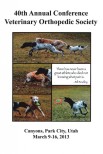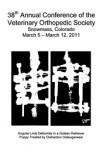Summary
Reasons for performing study
Mesenchymal stem cells (MSCs) have been used to treat equine tendonitis with promising results; however, little is known about the potential migration of these cells.
Objectives
To assess the possible migration of MSCs from an implantation site in the superficial digital flexor tendon (SDFT) to a lesion in the SDFT of the contralateral limb.
Study design
In vivo experimental study.
Methods
Adipose-derived MSCs were isolated from 4 healthy horses. Lesions were induced in the SDFTs of both forelimbs, followed by intralesional implantation of autologous adipose-derived MSCs labelled with nanocrystals into one of the limbs. Flow cytometry of the peripheral blood mononuclear cells and fluorescence microscopy of biopsies of the SDFT lesions were used to search for the labelled cells.
Results
Labelled cells were detected among the peripheral blood mononuclear cells in all animals, but labelled cells were present only in the SDFTs that were treated with the intralesional implants.
Conclusion
Nanocrystals were a valuable in vivo marker of MSCs to be used for tendonitis treatment. Although migration of MSCs to the bloodstream was observed, it was not possible to identify the labelled cells in the untreated tendons.









